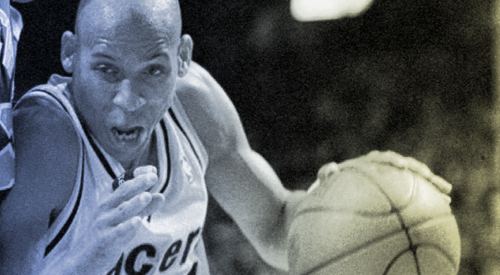
Can Reggie Miller save the Pacers yet again?
The NBA is no stranger to rumors. Every once in a while you come across a rumor that may actually be true, and it peaks your attention and has you contemplating every angle. This is what happened to me the other when I heard that the Indiana Pacers were considering Reggie Miller for a front office job, and that he’d replace a retiring Larry Bird.
On the surface, it’s a win-win scenario. A local favorite, and arguably the best Pacer of all time, comes back to the team in management. And it gets Miller off of TNT, a plus to any fan of their NBA coverage.
There’s an interesting resemblance between Miller and the man he’d replace, and not only in a local legend kind of way. Bird became GM of the Pacers in 2003 only a few years after his run coaching the team. When he was hired, he had no prior experience in management, but he came to a very good team. In his first season, the Pacers made it to the Eastern Conference Finals.
Like Bird, Miller has no previous experience. Unlike Bird, he would inherit a team that’s not very good. In the past five seasons, the Pacers have made the postseason once and haven’t finished above .500. They had the lowest attendance in the NBA last season, and play in one of the league’s smallest arenas.
They’re a bit of a rebuilding project. There are more than a few reasons why.
“The Pacers really, really ruined their reputation locally between 2004 and 2008,” said Jared Wade of the Pacers blog Eight Points, Nine Seconds.
[php snippet=1]
The Pacers problems started with The Brawl and continued with off-court problems ranging from arrests to bar brawls to drug-related suspensions. Management traded away troubled talent like Stephen Jackson, Jermaine O’Neal and Ron Artest for players in one-sided deals. The Pacers went from a 61-win team in 2004 to 35 wins in 2007.
“Many fans by that time were not just disinterested in a bad team,” said Wade. “They were actively boycotting an organization that they no longer considered fit to be part of their community.”
This is reflected in the team’s attendance numbers: in 2005, the year of the brawl, they drew 696,764 through the season. It dropped by 33,396 the next season and by roughly the same amount in 2007. In 2008, it fell to just over 500,000, the lowest in the NBA. In three seasons, attendance had dropped by close to 200,000. That’s a difference of about 10 home sellouts for the Pacers.
It’s worth noting that their arena is one of the smallest in the NBA; the Conseco Fieldhouse seats a maximum of 18,500 for basketball. There are external factors, too: unemployment in Indiana is at 8.1 percent and as recently as the summer of 2009, was above 10 percent. It’s hard to afford tickets when you aren’t working.
But most obvious is their on-court play: they improved in 2010-11, sneaking into the postseason as the East’s eighth seed. “[This year] helped push some of that to the rearview,” said Wade, “but it’s still not gone for many, particularly older fans.”
It especially stood out in this year’s playoffs, when Bulls fans outnumbered Pacer fans at the Fieldhouse in game four of their first-round series. Perhaps that’s why the team is thinking of bringing in a popular face from before the team’s troubles, like Miller or Chris Mullin. After all, what exactly does Miller bring to the team besides his legacy?
Who Miller isn’t like is Minnesota general manager David Kahn – whose previous basketball experience included nine years working for the Pacers and a stint as a sportswriter – or likeDaryl Morey, who graduated from MIT and worked for Stats LLC before becoming Houston’s GM.
Granted, Miller’s role would differ, but remember that even Isaiah Thomas had experience when he went to the Knicks.
The highlight reel on Miller is mostly variations on a theme: it’s Miller stepping back, hitting a three as the clock winds down in a tight game. He saved the Pacers time after time after time.
But what if he fails this time? If the Pacers regress and attendance continues to dive, what happens to his legacy as the greatest Pacer ever? It’s a tough call: if it goes wrong, it could end badly. After all, Miller wasn’t known for being selfless.
How long will the rehabilitation of the Pacers last?
“It’ll take another season or two of playoff appearances to rid it altogether,” said Wade.
“If they win a series next year? That could do it. But the Chicago series was probably the first time for a while that a lot of the fans who had given up actually even turned on their TV sets, let alone bought a ticket.”
The clock is ticking. Will the Pacers end up in Miller’s hands? It’s certainly fitting if it does.
[php snippet=1]

